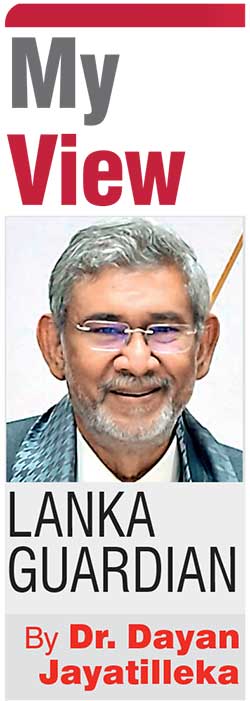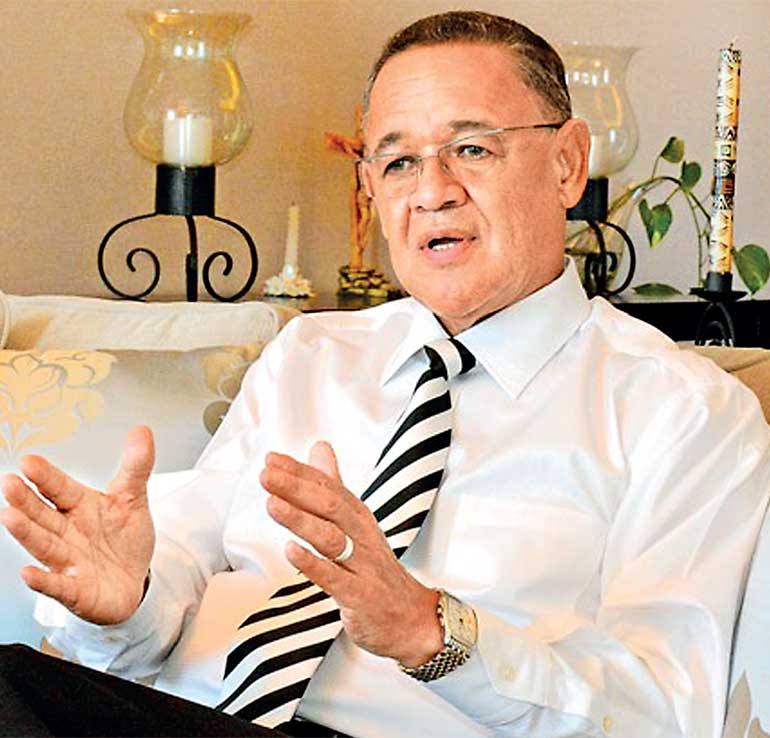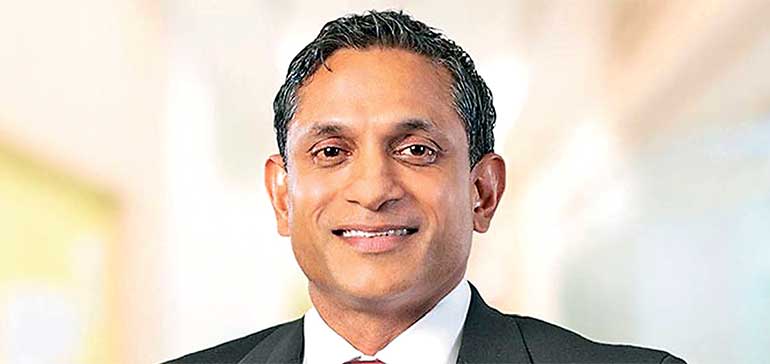Monday Feb 23, 2026
Monday Feb 23, 2026
Thursday, 22 December 2022 00:33 - - {{hitsCtrl.values.hits}}

|

A surreal crime: the gruesome, cruel death of Dinesh Schaffter, a decent, personable businessman belonging to a well-established family, resulting from deadly injuries intentionally inflicted in or on the way to the main cemetery of Colombo where dead bodies go—not where live people are killed—illustrates the decay of Sri Lanka in the current period. Colombo in the daylight hours has become the heart of darkness. The horror is bound to impact the image of the country and its business climate.
Geoff Doidge’s effort for peace
The news of another death, also sudden and saddening (though without the horror) was of Geoff Doidge at age 68 at his home in South Africa. He was a former High Commissioner of South Africa to Sri Lanka in the post-war second term of President Mahinda Rajapaksa. Geoff and his wife Carol who Sanja and I were privileged to count as friends, were militants of the African National Congress during the struggle for liberation from apartheid. Geoff joined the ANC at age 17 and rose to become a Minister in an ANC administration. We corresponded regularly even after his retirement and our last communication was in October.
It was several months ago that Geoff informed me of another friend, Ebrahim Ebrahim, a senior ANC personality and member of its armed wing the Umkhonto We Sizwe (MK), and fellow prisoner for 15 years on Robben Island with Nelson Mandela. I’d known Ebrahim from his first visits to Sri Lanka during the CBK presidency, in the search for peace.
Geoff Doidge worked hard for a durable, enlightened peace in post-war Sri Lanka and failed. Few knew how close he was to Mahinda Rajapaksa, whom he never regarded the primary obstacle to peace. Within government it was Basil Rajapaksa and his monopolistic political attitude that was the main roadblock. Gotabaya Rajapaksa as Secretary/MoD, when on his own, proved more amenable than Basil and actually engaged in a visit to South Africa to discuss its experience of Truth and Reconciliation, but snapped back into hawkish mode when boxed-in by, his real brothers-in-arms, the security hardliners many of whom schooled and served with him. They remain the Deep State even in the Wickremesinghe administration.
Geoff was among a sympathetic, supportive handful, which included the South Korean ambassador and Cardinal Malcolm Ranjith, who succeeded in securing from President Mahinda Rajapaksa, the Northern Provincial Council election in 2013.
That precious re-opening of political space was wrecked by the irrational adventurism of Chief Minister Wigneswaran who left the swearing-in ceremony lunch and official photograph with President MR —all of which I was present at—and issued within the hour, a statement reiterating a commitment to “internal self-determination” which gave Basil and Gotabaya, both of whom who had absented themselves from the ceremony, a credible handle to block further progress and to reverse the implementation of Mahinda’s pledge to the Indian High Commissioner and the TNA to appoint civilian (not necessarily Sinhala) governors for the North and East.
Ethnic Reconciliation Roundtable 2023
President Ranil Wickremesinghe has convened an all-parties roundtable conference to seek ethnic reconciliation. It may be useful to share my observations on the historical experience so far.
1. The search for peace during the long years of war proved unsuccessful primarily because of the fanaticism of the LTTE, as proven by its full-on war against the Indian Peace-Keeping Forces, its assassination of Rajiv Gandhi, and its boycott of the donor conference in Tokyo in 2003 despite the de facto international recognition it would have afforded. The LTTE repeatedly spurned chances for peace and sympathetic mediation (India) which no other armed movement would have.
2. President Mahinda Rajapaksa cannot be faulted for the eruption and continuation of the last war. The Human Rights Watch report entitled Funding the Final War (March 2006) clearly proved that Prabhakaran had planned a final war to take place in late 2004 but it had to be postponed due to the tsunami. LTTE sources throughout the world resumed the funding drive in the post-tsunami period on the explicit grounds that the money was for the Final War to establish Tamil Eelam.
3. In the post-war period, which is most relevant to us today, the blame for the failure to reach a sustainable peace should be shared equally (‘50:50’) between two players, the Rajapaksas and the TNA. The Rajapaksas, mainly Gotabaya and Basil, sought to cultivate and were influenced by the Sinhala chauvinists who had beaten the Tigers but thought they had beaten or could beat the Indians too and wanted to roll-back the India-Sri Lanka Accord and the 13th amendment. The TNA forgot that it had been a fellow traveller of a losing side in a war but still had the Accord and the 13th amendment as perimeters behind which Tamil autonomy could be protected. Instead, it refused to take the 13th amendment as the basis for post-war negotiation and pushed for a solution that went beyond the 13th Amendment. After a visit, Sumanthiran complained that the degree of provincial autonomy in South Africa, i.e., in Mandela’s Constitution, was too little.
A roundtable on reconciliation requires confidence-building measures, reciprocity and linkage. What comes immediately to mind is the holding of the local government elections on schedule. If the Wickremesinghe administration blocks that which the other political parties so badly want, it cannot expect the Opposition parties to be noble enough to compartmentalise and cheerfully cooperate with the president, giving him something he needs for external consumption with nothing to show in return. It is a seller’s market.
Why would anyone think that the majority of citizens would accept ethnic reforms from a leader they haven’t elected even to the legislature as their representative?
Furthermore, how often does the majority of the citizenry in any country adopt a generous, moderate and reasonable stand on ethnic autonomy while suffering from grave economic hardships imposed by the Government?
An attempt by the Wickremesinghe administration to push through ethnic reforms or an accountability mechanism in a context of increased economic burdens, selling-off public property and blocking democratic elections, could spark a forest fire.
President Ranil Wickremesinghe cannot hope to secure multilateral support for ethnic and accountability reforms while acting unilaterally on economic austerity, restructuring and the holding of long-delayed local elections. Either Ranil has to abandon his aims of ethnic reconciliation or retreat on the economic and electoral-political fronts.
 |
| Former High Commissioner of South Africa to Sri Lanka Geoff Doidge |
 |
| Dinesh Schaffter
|
Statism and social consciousness
The Ranil Wickremesinghe administration and the economic policy wonks in the state apparatus, civil society and the main Opposition simply have to understand a fundamental reality before embarking on a course of action or adopting a policy stance that can contribute to a civic conflagration. That reality has been laid bare by the results of a joint research study by the Social Scientists Association (SSA) and the USAID which reveals that a stunning 93+% of the public polled, stand opposed the selling-off of national assets even while taking into account the economic situation:
“A majority of the Sri Lankan population are against selling of national assets considering the situation of country’s economy, a survey has revealed.
A survey carried out by Social Scientists Association led by Prof. Jayadeva Uyangoda together with USAID had revealed that 93.8% of the younger generation and 93.2% of the elderly population does not think national assets should be sold off.
Only 42.1% of the youth and 47.4% of the elderly believe that recruitment of persons to the state sector should be minimized.
As per the research report 69.1% of the youth population and 69.4% of the elderly population believes that development projects implemented in Sri Lanka after the war will have some benefit to the nation in the future.
Meanwhile the survey has also revealed that 76.6% of the youth population, and 71.9% of the elderly population believe that rulers have to be responsible for the country’s economic downturn while 32.4% of the youth and 28% of the elderly believes that COVID-19 pandemic had contributed to the economic down turn.”
(Majority of Lankans don’t want national assets sold: Survey reveals - Breaking News | Daily Mirror)
Foreign Minister Sabry’s determined declaration that a chunk of state property will be sold off soon in order to raise $ 3 billion, will come up against not merely the trade unions of those enterprises and sectors but the sentiments of pretty much the entirety of the country’s citizenry.
Hurting the national sentiment of the majority on economic policy issues while also impinging on nationalist sentiment through ethnic reforms is a high-risk operation, which, coming from an unelected leadership, could be suicidal.
Economic policymakers in Sri Lanka, starting with President Wickremesinghe but moving across to the Opposition have failed to grasp the ethos of the society, the country they are seeking to enact policy in. One of the fundamental factors and features the liberal economists fail to grasp, which the SSA-USAID study is confirmation and reminder of, is that the Sri Lankan ethos is quintessentially statist.
I was on a panel at the School of Advanced International Studies (SAIS), Washington DC in late 2005 with Joel Schumacher of Refugee International, discussing the comparative performances of Louisiana, Aceh and Sri Lanka after the tsunami and Hurricane Katrina, and Schumacher’s conclusion as to why Sri Lanka recovered faster than the other two places –though Indonesia made more progress in conflict transformation—is that the social contract in Sri Lanka was in effect ‘social democratic’; one in which the citizens expected the state to play a major role as actor and deliverer of public goods, and held it responsible.
The foundational Social Contract in Sri Lanka is state-centric, and the reasons could be located on two axes: historico-existential identity and that of historical modes and patterns of production.
The small island of Sri Lanka, at the foot of a large subcontinental landmass, has maintained its distinctive civilisational identity, which isn’t shared by its neighbours, through a guarantee provided by its state formation. That guarantee provides the legitimation for the state.
Any segmentation of the unitary state formation along the lines of ethno-federalism while on the doorstep of a Tamil Hindu landmass is perceived as a centrifugal threat of an existential character. Devolution/autonomy within a unitary state is the sole viable, sustainable option.
The second dimension is that of the historically evolved political economy of production. Sri Lanka did not have an orthodox feudal mode of production (FMP) with large private landholdings belonging to feudal families as the predominant feature. Instead, it had a hydraulic civilisation which could only be maintained by the (monarchic) state. This was the ‘Asiatic mode of production’ (AMP) as Marx called it, rather than a classically feudal one.
Any shrinkage of the state through the long lease of territory or divestiture of strategic economic assets, is perceived as an existential threat.
Public discourse reveals a privileging of the regulatory function of the state such as management of prices of essential products and services. There is a close identification of the ‘state’ with the ‘national’ and the ‘public’, while private capital, the unfettered market and the pure profit motive are seen as alien to the national and public interest.
Any attempt to change this statist social contract, almost a social and political cosmology, unilaterally –and by an unelected leadership at that—is bound to end in catastrophe.
The Sri Lankan state or any state for that matter has to be understood in two senses, horizontal and vertical:
(i) Horizontal: its territorial or spatial dimension, which includes its economic topography
(ii) Vertical: its political superstructure.
The SSA-USAID research findings confirm that in the first dimension, the state is not merely legitimate but central to the Sri Lankan consciousness. Note that the 93+% opposing divestiture of national assets far exceeds the percentage of Sinhalese and that their opposition to divestiture is despite the economic emergency. There is immanent legitimacy and an existential-emotional bonding with the state in the horizontal sense: the state as a formation embracing, demarcating and guarding a territorial and economic space.
The same is not true of the state as a political or governance superstructure. Here the abiding attachment is to the democratic state, but that attachment is conditional and conjunctural. Insofar as (a) the politico-governance structure, process and practices remain democratic, reflecting popular sovereignty, and (b) the rulers act in accordance with their mandate, so too does the citizenry remain loyal. If the politico-governance structure, processes and policy practices deviate from democracy, the people led by the youth rise in revolt—as happened after the closure of the system by the Referendum of 1982 and the Aragalaya 2022.
Next year, the economic ideology of President Ranil Wickremesinghe which is nihilistic towards the state sector, will make full contact with the realities of Sri Lanka’s social forces and their collective consciousness. If local government elections are held on schedule, that contact will be mediated, refereed, institutionalised; the impact cushioned; the effects deflected and diffused. If not, the contact will be of a kinetic character, unmediated, agonistic, gladiatorial and zero-sum.
‘Neoliberal fascism’?
Structurally, the Sri Lankan state has four distinct politico-representational levels: presidential, parliamentary, provincial, municipal/pradesheeya sabha.
At the apex, we have an unelected president. At the parliamentary level we have a ruling party elected on a platform of anti-Ranilism which has since embraced Ranilism and installed Ranil as president, therefore negating its mandate. At the provincial level elections haven’t been held because of an overload of revisions and subsequent deadlock. At the pradesheeiya sabha level, elections are long overdue, with every indication that the Government will attempt further postponement.
Thus, at every one of the four levels of Sri Lanka’s political (i.e., state) system today, there is either an absence or a drastic deficit of public consent and legitimacy. Taking all four levels together, the Sri Lankan political system as a totality suffers an acute crisis of legitimacy.
President Joe Biden demarcated democracy from autocracy using a litmus test: “In a democracy, the people elect their leaders”. If the four levels of the political system lack the legitimacy of public consent through a democratic mandate, in what sense can the Sri Lankan political system today be classifiable as democratic, leave alone liberal-democratic?
How to define an undemocratic or de-democratised political system and process bearing a warhead of neoliberal economic shock therapy? Henry A. Giroux who holds the McMaster University Chair for Scholarship in the Public Interest in the English and Cultural Studies Department and is the Paulo Freire Distinguished Scholar in Critical Pedagogy, has named the phenomenon in the title of his latest essay in Counterpunch: Neoliberal Fascism.
If the local authorities election is blocked and Sri Lanka’s political system is no longer functionally democratic, what methods of effecting change become activated by default? If the political system is no longer legitimate, what modes of struggle for the restoration of multi-party competitive electoral democracy, democratic republicanism and popular sovereignty then become legitimate?